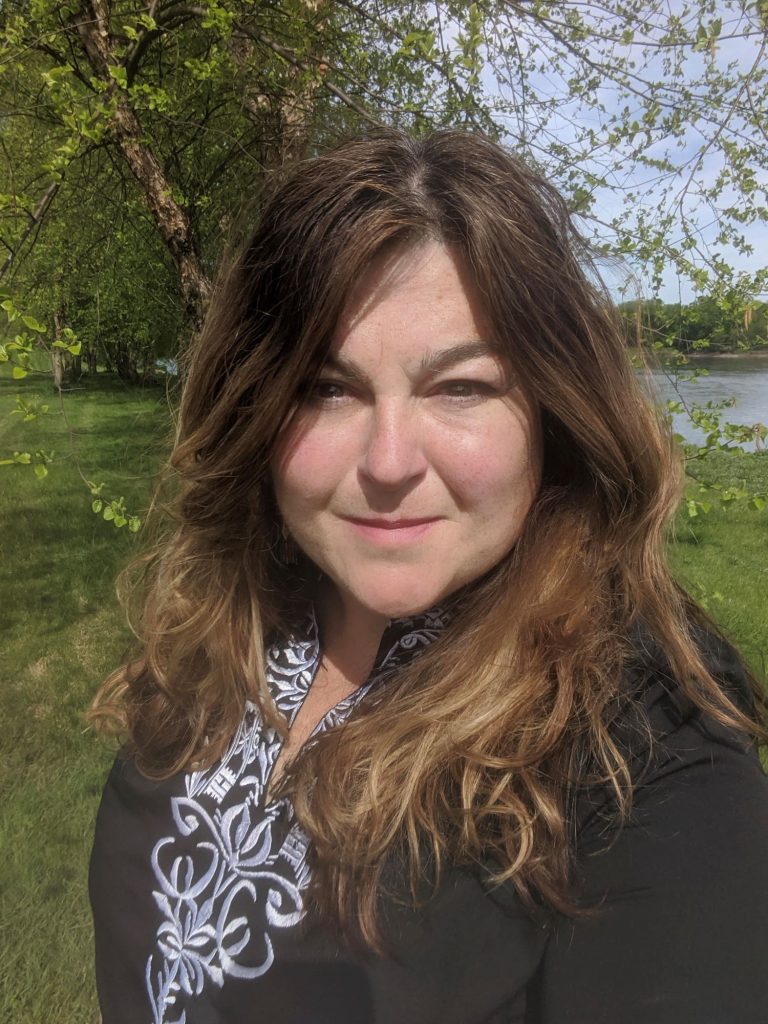
Catching Up with 2020 Crazyhorse Nonfiction Prize Winner Dawn D’Aries
November 2, 2020 | blog, interviews, news


Dawn D’Aries was a finalist for the 2016 PEN/Bellwether Award for Socially Engaged Fiction. “The Super’s Wife” represents parts pulled together from a full-length work of creative nonfiction. As an editor and journalist, she has written on a variety of news and feature topics, and counts The Rumpus among her most recent creative nonfiction credits. She currently is an adjunct instructor of writing and literature for four colleges in northeast Pennsylvania.
CH: How would you describe yourself, both as a person and a writer?
DD: I am a resilient, intuitive, and private person, although privacy is a shell I have been shedding over the years. I am more comfortable sharing my innermost thoughts by way of creative nonfiction now than I ever have been in my life. As a writer, I am adaptable, evolving, and playful. Writing is my lifeblood and has been since I learned how to hold a pencil. I have tried a couple of times to gravitate toward a livelihood that is not writing-based (for example, years ago, I started night school to learn how to become a massage therapist), but I always end up doing something connected to writing and editing – whether as a reporter, trade publication editor, public relations manager, or college instructor. One of the best things I ever did in terms of writing was to take a business typing class in high school – it has made it incredibly easy to transfer my thoughts in a split second on to the page.
CH: I see that you write fiction as well. Have any specific writers, either fiction or nonfiction, influenced your work more than others?
DD: Mysteries have had my heart since childhood, when I admired the plotting and characterization in Ellen Raskin’s The Westing Game, and devoured all the Nancy Drew and Agatha Christie novels. In adulthood, I’m always interested in more Karin Slaughter, Tana French, Ruth Ware, Gillian Flynn. I like a bit of mystery in everything I read and incorporate the same into my writing.
I gravitate toward fiction more than nonfiction, and read such a variety that it’s difficult to iron down a couple of writers as influencing my work more than others. If pushed to describe authors I think my writing is similar to, I would list Melissa Banks, Jennifer Egan, Jhumpa Lahiri, Alice Munro, Elizabeth Strout, Lianne Moriarty, Celeste Ng, Ann Patchett. It really depends on exactly what I am writing. In nonfiction, I admire the work of Laura Hillenbrand, Susan Orlean, and Jon Krakauer.
CH: What advice would you give a writer who is interested in writing creative nonfiction for the first time?
DD: If it’s your own story, be true to yourself. Write for yourself. Forget audience.
If it’s someone else’s story, get the facts correct.
CH: What are you working on next?
DD: A mystery – or maybe it is psychological suspense — drawn from my experiences as a camper and then as a counselor at a girls-only camp in the Poconos. It’s fun, because I loved camp and remain close friends with several of the people I met there when I was 12 years old. My friends are cheering me on to get this work finished and published.
CH: Have you read anything recently that you just can’t stop thinking about?
DD: One book which I have referred to in conversation over the past few years is Naomi Alderman’s The Power. It’s an interesting study of patriarchy versus matriarchy. The overall moral of the book is power corrupts, no matter who has it.
Also, for the past several years I have talked up Claudia Rankine’s Citizen: An American Lyric – everything about that book is timely, from the cover to the content.
And early on in the pandemic, when people were looking for good reads, I suggested Emily St. John Mandel’s Station Eleven; grim in some respects but she also weaves in glimmers of hope for humanity.
Throughout the years, other books have stuck with me for a variety of reasons: the perspective and philosophy in Grendel, by Pennsylvania native John Gardner; the structure of Kurt Vonnegut’s Slaughterhouse-Five; and Margaret Atwood’s intricate plot in The Blind Assassin.
One of my all-time favorite, most memorable reads was the nearly 1,000-page The Mists of Avalon (by Marion Zimmer Bradley), which is a King Arthur retelling from the female perspective. I always come across women who have read this and thoroughly enjoyed it, too.
More recently, I identified with several elements of Mary Beth Keane’s 2019 Ask Again, Yes. Keane wrote brilliant parallels.
CH: What did the writing process for The Super’s Wife look like? What were your goals in writing it? What first drew you to writing creative nonfiction?)
DD: I spent my 20s working as a reporter and editor – writing about other people’s lives and editing other people’s stories.
The writing process for The Super’s Wife involved churning out hundreds of thousands of words over more than a decade to plow through grief and trauma. I wrote about some memories at least a hundred different ways and from different points of view.
Eventually, time gave me a more objective perspective and I was able to write more forthrightly about memories which had once been too painful to think about. I felt more clear-eyed about Mark and my time with him. I started piecing together a chronological order of events, playing with the structure, editing. I also started writing about other traumatic experiences I’d had in my life.
In fiction, I always kept audience in mind. Is the plot well-developed? Character dialogue sounds natural? Consistency with details? Better as third-person or first? Multiple points of view OK or should the story be from one point of view?
But with creative nonfiction, my goal was self-therapy. I focused on writing for a one-person audience: me. I wanted to get the truth out of my brain – a cathartic cleansing – and on to the page.
Eventually, I saw an online magazine’s request for #MeToo stories. I had a creative nonfiction piece which did not have anything to do with Mark. I was inspired to send my story to the magazine because I thought it could help someone who might be going through a #MeToo situation similar to that which I had been through. I also hoped the work could contribute to others’ understanding of the thought process of people who had been in the particular situation I had been in. The magazine accepted the piece and published it.
As a private person, I had harbored fear about sharing elements of my personal life with others. But once that story was published, I didn’t feel fear anymore. Instead, I felt relief.
The Super’s Wife is about class structure, marriage, suicide, love, secrets, lies… I have learned a lot by reading. I started thinking that my story could contribute to conversations in some small way.
In the middle of a cold January evening in 2020, I fiddled and edited and played around (this is my idea of fun) with the full-length version of The Super’s Wife, and pieced together a sampling of it. And then, it seemed, I was done. Now what? In that moment, I decided to submit the sampling somewhere.
I looked around on the internet for upcoming literary journal contests, took note of the word count limits, and whittled The Super’s Wife down to meet the contest rules.
And then I submitted.
Submissions for the 2021 Crazyhorse Nonfiction Prize open on January 1st 2021.
Submit your work here: https://crazyhorse.submittable.com/submit
Writers may submit essays up to 25 pages. Winners receive $2,000 and publication. All entries will be considered for publication, and more than one essay may be entered. Before you submit, please remove your name and any other identifying information from your manuscript. Simultaneous submissions are okay, as long as you contact us should the work be accepted elsewhere. The $20 entry fee includes a one-year subscription to Crazyhorse.
